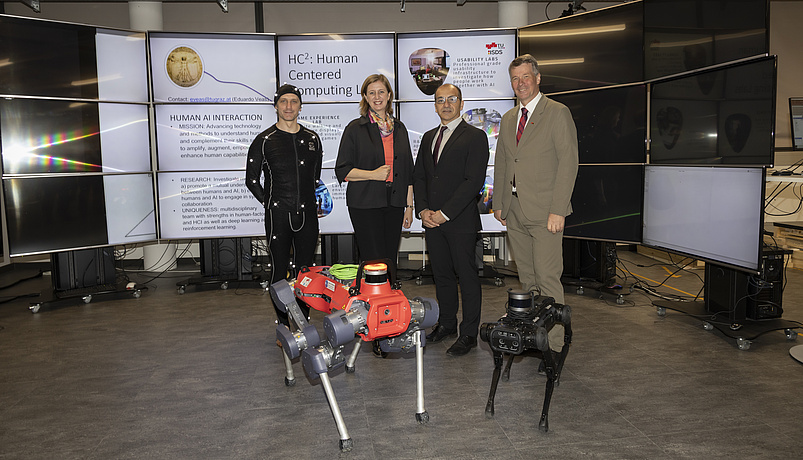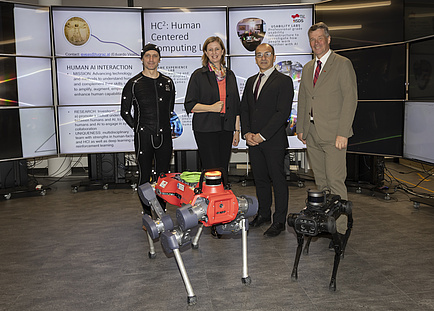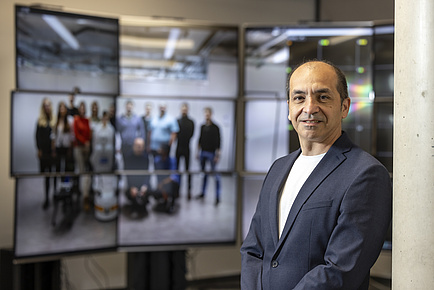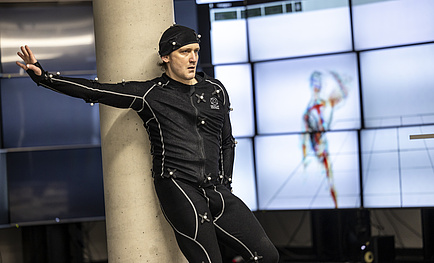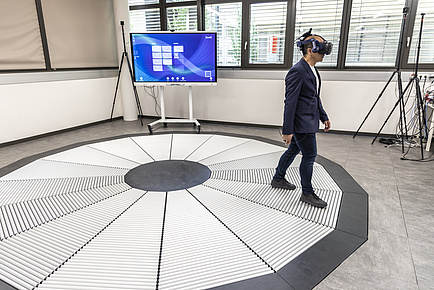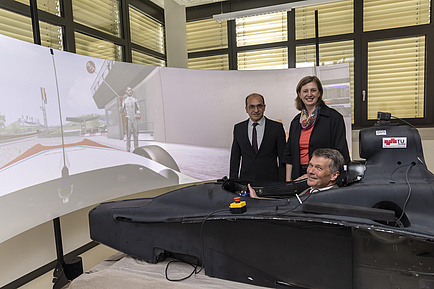Human-centered computing is a rapidly growing field of research in which the needs and behaviour of people are becoming the focus of the development of technologies and computer applications. The constant increase in available data and the growing complexity of IT systems calls for adequate visualisation of information and extended interaction possibilities between man and machine, for example via the virtual reality interface.
With the newly opened Human-Centered Computing (HCC) Labs in the Data House on Campus Inffeldgasse, TU Graz now has one of the most modern research facilities in Europe in this field. Due to the wide variety of technical infrastructure, they clearly stand out from other laboratories with the same name. Numerous technologies are housed here in a research laboratory that can be combined for interlinked research in a wide range of disciplines, for example to move autonomous driving forward, improve brain-computer interfaces or combine virtual worlds of the highest quality with artificial intelligence and robotics. For example, VR-controlled telepresence using robots will be possible in real time to carry out work remotely or explore dangerous areas. The establishment of the HCC Labs was funded by the Federal Ministry of Education, Science and Research.
Many research disciplines in one place
“TU Graz is one of Europe’s leading research institutions in the field of visual computing. With this new leading-edge infrastructure, TU Graz has a laboratory that is unique in Europe and enables completely new research in the field of human-centered computing,” says TU Graz Rector Horst Bischof. “I would particularly like to thank the Ministry of Education, Science and Research for the generous funding that has enabled us to build this new, internationally competitive infrastructure. I am convinced that this will enable us to further consolidate our leading position in this field of research.”
Laboratory head Eduardo Veas from the Institute of Interactive Systems and Data Science at TU Graz adds: “Computers and robots can do more and more and are becoming increasingly complex. The question of how this multidimensional information can be presented in a user-friendly way and how people interact with machines is therefore becoming increasingly important. Numerous research fields and technologies are converging here: visualisation, user interfaces, mixed reality, game design and AI such as image recognition and image processing, robotics and autonomous driving. In our Human-Centered Computing Labs, we have the infrastructure to bring all these disciplines together.”
Ongoing project unites interdisciplinary team
Eduardo Veas is currently experiencing just how valuable this localised merging of different disciplines is in a project with the University of Leoben, in which a robot explores a mine gallery using numerous cameras and sensors. It not only records the surroundings and displays them in virtual reality, but also recognises whether there are gases in the gallery before people enter it. Numerous challenges had to be and still have to be solved. Eduardo Veas’s team carries out research on the visualisation of the reconstructed sensor data and the representation of the environment as well as interaction via VR. But there are other challenges that are the subject of research in this project. Since there is no light, electricity or means of communication in the gallery, a strategy must first be developed for setting up the infrastructure. To master these tasks, a large team from various disciplines works together – in the HCC Labs, everyone involved has the technology they need at their disposal.
Six different laboratories
The Human-Centered Computing Labs at TU Graz are divided into six laboratories on the ground floor of the Data House on Campus Inffeldgasse, which are dedicated to various aspects of research:
The Immersive Computing Lab: A large laboratory that is fully equipped with motion capturing technology. This allows people and machines such as drones or robots to be captured throughout the space and their avatars to be transferred into digital environments. The quality of the technology is so high that professional film teams could shoot scenes in virtual worlds here. The laboratory is also a testing space for various robots and for VR and AR applications. In order to be able to move freely in the virtual rooms, there is a movable floor on which users can walk in all directions without moving forwards in the real room. Among other things, this will be used to do research on remote sensing using robots, in which a robot is placed in an unexplored or potentially dangerous area, the environment is transmitted into a VR room and the users control the robot via the moving floor.
The Vehicle-Human Interaction Lab contains modern racing simulators that are synchronised with sensors to record physiological data. This can be used to test external influences on drivers as well as reactions to stress while driving. Research is also being carried out here on autonomous driving.
The Game Experience Lab is dedicated to game design, innovative teaching and learning methods as well as new ways of presenting and communicating research content. A lot of work is done here using virtual reality, but the focus is also on topics such as data collection and its user-friendly preparation for further analysis or application.
In the Wearable Technology and Interface Fabrication Lab, students learn how to build their own input and control devices such as data gloves or data glasses. New applications can be tested in the Usability Lab, which consists of two identical test rooms with a control room in between, from which both test rooms can be observed through one-way mirrors. Finally, there is the Classroom Lab for theoretical work and teaching.
This research topic is anchored in the Field of Expertise "Information, Communication & Computing", one of the five strategic research foci at TU Graz.
Would you like to receive the latest stories, news, research stories, interviews or blog posts from TU Graz directly on your smartphone or in your email inbox? Subscribe to the TU Graz Telegram newsletter free of charge.
